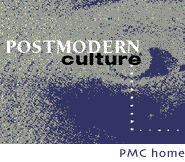
Bradley Butterfield
University of Wisconsin, La Crosse
butterfi.brad@uwlax.edu
© 2003 Bradley Butterfield.
All rights reserved.
- Leonard Wilcox is right that the conception of symbolic exchange has continued to inform Baudrillard's work up to the present, but until 9/11 Baudrillard had stopped using the language of symbolic exchange, preferring instead to speak in terms of "seduction," "fatal strategies," and so on, which, as Rex Butler points out, nevertheless mirror his original model of symbolic exchange. And until 9/11 Baudrillard also seemed to have given up on the utopian prospect of a return to the symbolic order. I would still aver, pace Wilcox, that the "key texts for understanding the way in which America responded to the events of September 11" are the earlier texts that I cite. The later texts, as Wilcox himself demonstrates, focus on terrorism and hostage taking as moments of simulation, media spectacles that remain "frozen in a state of disappearance." But the incredible symbolic violence---the sacrificial demand, the singular challenge to the West and everyone in it--of this event, I would still suggest, made Baudrillard, and should make all of us, consider the basic tenets of symbolic exchange once again: challenge, singularity, obligation, reciprocity, honor.
- The question at issue here, as Wilcox makes clear, is whether the violence of 9/11 has since been absorbed in the "infinite multiplication" (Wilcox) of signs in the West's culture of simulation, or whether, as Baudrillard writes in "L'Esprit," it did indeed restore an "irreducible singularity to the heart of a generalized system of exchange." For Baudrillard, the answer is of course both: the event begins by overwhelming our interpretive models, but then the latter end up overwhelming the event. And yet the damage has been done. We cannot avoid the singular challenge, the obligation to respond. If "we" (let us imagine for argument's sake that "we" are the U.S.) ignore the symbolic point d'honneur, which people all over the world still recognize even if our corporations, governments, and media do not, then we create still more hostility and must expend increasingly more energy and money in our attempts to contain this hostility. The "system" grows stronger and weaker at the same time, and the "reversal" Wilcox speaks of is in fact the point at which the U.S. is obliged to become the opposite of what it presumed to stand for. The "democratic" West must become an infinite police state in the name of democracy. Thus the effectiveness of their symbolic violence: one cannot not respond, sacrifice begets sacrifice, one way or the other.
- "Our" other choice of response, rather than sacrificing every last resource in a ridiculous war against "evil," is to make a different kind of sacrifice, placing the symbolic obligation back upon the terrorists. A gesture of "forgiveness," as I wrote, entailing a sacrifice (a "gift of life" rather than of death) even greater than the terrorists' self-immolation on 9/11, is the only way to restore honor on "our" side, forcing the terrorists either to lay down their swords or to lose face according to the symbolic code. But this of course cannot happen, even if "we" wanted it to. For the real "evil" today, as Baudrillard maintains in the works Wilcox points to, is the transparency of information, its omnipresence in a system where everything is revealed and yet nothing can be contested. Only a miraculous mass conversion of humanity's collective will could change the "system" at this point, and the media monoliths will never let that happen, and the terrorists know it. And so their brilliance lies in the simple trick of enlisting the system against itself, by staging a single event that would be powerless if not for the media's propagation of it. Their bet is that "we" will expend and ultimately ruin ourselves in our infinite war against an invisible, and at this point hyperreal, enemy. The system finally implodes by the weight of its own gravitational mass. This, of course, was Baudrillard's prophesy too, something he tried to produce in his theorizing and encourage in other aesthetic modes. I remain ambivalent, as Wilcox says. I believe that there is still a sense of honor among individuals on this planet (symbolic obligation haunts our consciences just as "death" continues to haunt the "system), but the "system" has no honor, and neither its destruction nor its continuation seems desirable to me at this point.
Department of English
University of Wisconsin, La Crosse
butterfi.brad@uwlax.edu
Talk Back
COPYRIGHT (c) 2003 Brad Butterfield. READERS MAY
USE
PORTIONS OF THIS WORK IN ACCORDANCE WITH THE FAIR USE PROVISIONS OF U.S.
COPYRIGHT LAW. IN ADDITION, SUBSCRIBERS AND MEMBERS OF SUBSCRIBED
INSTITUTIONS MAY
USE THE ENTIRE WORK FOR ANY INTERNAL NONCOMMERCIAL PURPOSE BUT, OTHER THAN
ONE COPY SENT BY EMAIL, PRINT OR FAX TO ONE PERSON AT ANOTHER LOCATION FOR
THAT INDIVIDUAL'S PERSONAL USE, DISTRIBUTION OF THIS ARTICLE OUTSIDE OF A
SUBSCRIBED INSTITUTION WITHOUT EXPRESS WRITTEN PERMISSION FROM EITHER THE
AUTHOR OR THE JOHNS HOPKINS UNIVERSITY PRESS IS EXPRESSLY FORBIDDEN.
THIS ARTICLE AND OTHER CONTENTS OF THIS ISSUE ARE
AVAILABLE FREE OF CHARGE UNTIL RELEASE OF THE NEXT ISSUE. A
TEXT-ONLY ARCHIVE OF THE JOURNAL IS ALSO AVAILABLE FREE OF CHARGE.
FOR FULL HYPERTEXT ACCESS TO BACK ISSUES, SEARCH UTILITIES, AND OTHER
VALUABLE FEATURES, YOU OR YOUR INSTITUTION MAY SUBSCRIBE TO
PROJECT MUSE, THE
ON-LINE JOURNALS PROJECT OF THE
JOHNS HOPKINS UNIVERSITY PRESS.
